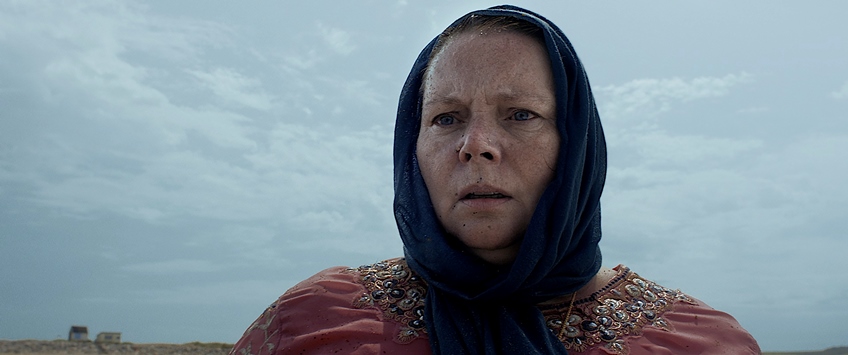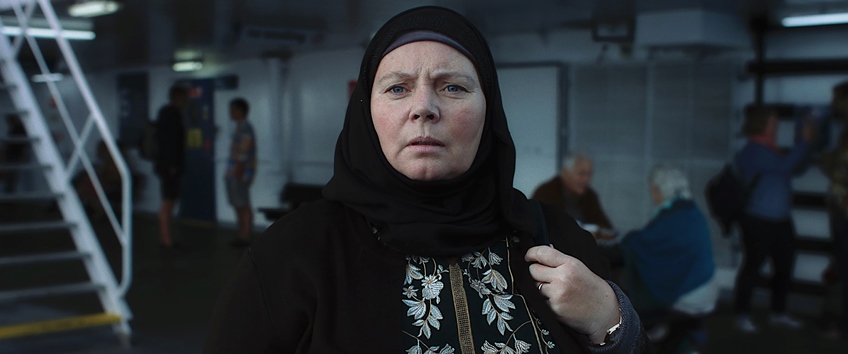AFTER LOVE (June 4, 2021) in UK & Irish cinemas Cert 12A / 89 mins.
In British-Pakistani writer-director Aleem Khan’s feature debut, Mary (Joanna Scanlan), a sixty-something, Caucasian, English woman who converted to Islam for marriage, enters the life of Solomon (Talid Ariss), a gay, mixed-race, French teenager with life changing consequences for them both. Through this encounter, After Love explores what it is like to exist between two worlds, feeling like an outsider in each. But Solomon and Mary have something else in common. Both have been deceived by the only man in their lives, one whom they respected and loved. What stretches credibility, while at the same time fuels the film’s tension, and drives the plot, is that Mary embarks on a new deception to understand her own.
A Muslim couple in their sixties, Ahmed (Nasser Memarzia) and Fatima (Scanlan) return to their comfortable home after celebrating a new birth in the family, one that can only cause childless Fatima regret. ‘It’s no different from a baby getting its head dumped in a bowl of water in a Christening,’ Ahmed says as he goes into the living room to relax with some South Asian music.
‘They don’t actually do that, though’, Fatima points out as she puts on the kettle, smiling as her husband tries to sing in key to the music. You imagine that this kind of conversation has been going on throughout their long marriage, for though Fatima has converted to Islam, she was born and raised in the UK with the name of Mary.

As Mary pours the tea, Ahmed, who captains a ferry boat service between Dover and Calais, collapses and dies. At the post-funeral gathering, Mary sits awkwardly, like an outsider, mourning alone with Ahmed’s oppressive family. We notice there is no one from Mary’s family and no phone calls to them – suggesting that the marriage has had an even higher personal cost than meets the eye.
While clearing out Ahmed’s affairs, looking for solace and objects to remember him by, she comes across the French ID card of a white woman in her late fifties with the French name Geneviève. Puzzled, or shocked by the discovery, Mary crosses the channel and checks into a hotel before setting out on her mission. Showing up at Geneviève’s (Natalie Richard) house in Calais wearing a drab, unflattering Salwar Kameez and head scarf, Geneviève mistakes her for the cleaner she hired for an end of tenancy clean up. Geneviève has bought a new home in the same area.
Mary has rehearsed her announcement, but she is frozen into silence by the reality of the situation. Believing Mary to be an immigrant who speaks no French, Geneviève gives her instructions in English.
In a kind of surreal delirium, Mary starts cleaning out the house of her dead husband’s mistress. As the cleaning continues over several days, Mary’s curiosity is gradually appeased. But it is Geneviève’s son Solomon who captivates her, for he is the child that she and Ahmed apparently lost, and though not explained, probably could not have. If Mary once planned to break the sad news to Geneviève, she has missed her opportunity.
But Mary pays the price as both mother and son tell her how much they are looking forward to Ahmed’s next visit and when Genevieve worries that he has not called her as promised. Worse still, Solomon, who is sneaking around the house with his handsome boyfriend and blaming his mother for chasing away the father he idolises, resolves to go live with Ahmed in Dover.

It is no mean feat for a film to have the audience actively involved in questioning who has the moral high ground, when all four characters in the film are flawed.
And though you might struggle to imagine Mary as an individual as opposed to being “the convert” and “the wronged woman”, there are some nice, fresh touches that help. One is when Mary looks at herself undressed in the hotel mirror, perhaps for the first time in years. Possibly prompted by her blond, more attractive and svelte rival in western clothing, she inspects the folds of flesh around her midriff, as though wondering if Ahmed preferred a thin, modern woman over a corpulent housewife.
Another is when Mary, as though on autopilot, offers to make lunch for Solomon on the day of the move, when there is nothing but leftovers in the cupboards. Here she has overstepped her bounds, and when Geneviève arrives to see Solomon and Mary seated at the table enjoying her favourite ethnic dish, the temperature rises.
It might come as a shock to TV viewers to see Scanlan, the PR expert Terri Coverley in The Thick of It, stretching, almost supine, toward Mecca, but this is not the first time she has played an invisible, middle-aged woman with an unfaithful husband. Scanlan was excellent as Catherine Dickens in the 2014 biopic The Invisible Woman, a title that applied there, as does here, to both women in the triangle. She played another invisible woman with a hard life in 2013’s Pin Cushion.
Khan has almost succeeded in combining two films into one, but After Love suffers from being spread thin. Khan seems more interested in exploring the issues around race and culture through Solomon, than in getting in the minds of two deceived women. But even the Solomon story is truncated, glossing over the issue of how his Pakistani father will greet the news of his illegitimate son’s homosexuality.
Nothing bad is said of Ahmed, as though no one can imagine a man who prays five times a day and doesn’t drink being a selfish, two-timing liar. Mary has given up her faith, her friends, her family and her culture for a man who does not ask his mistress, and the mother of his child to give up anything – except the security of marriage. This is a family melodrama to rival anything in Eugene O’Neill. Like Scanlan’s terrific, understated performance, Khan wisely plays down the melodrama inherent in the plot. But some viewers will be crying out for a bit of righteous anger.
You can read our review of The Invisible Woman here.
You can read our review of Pin Cushion here.




